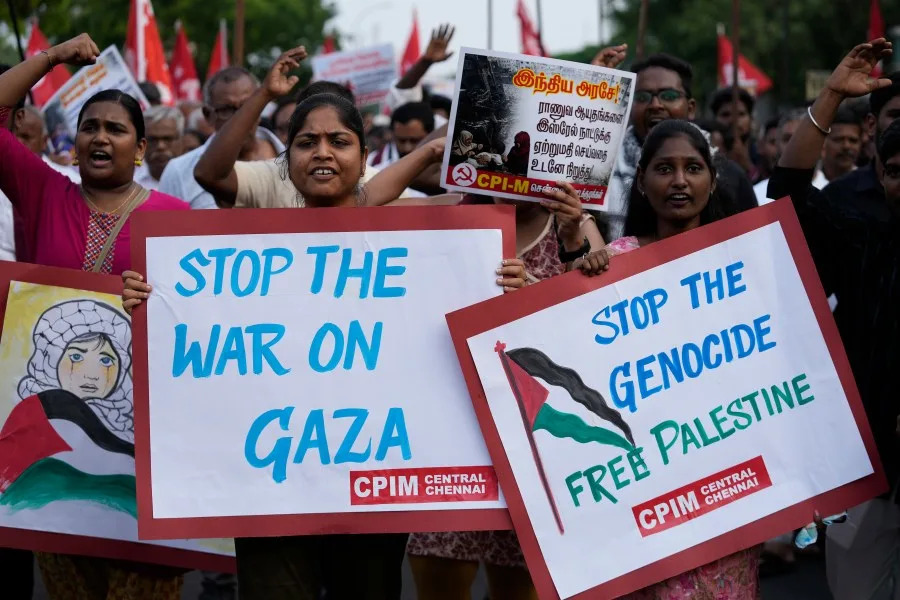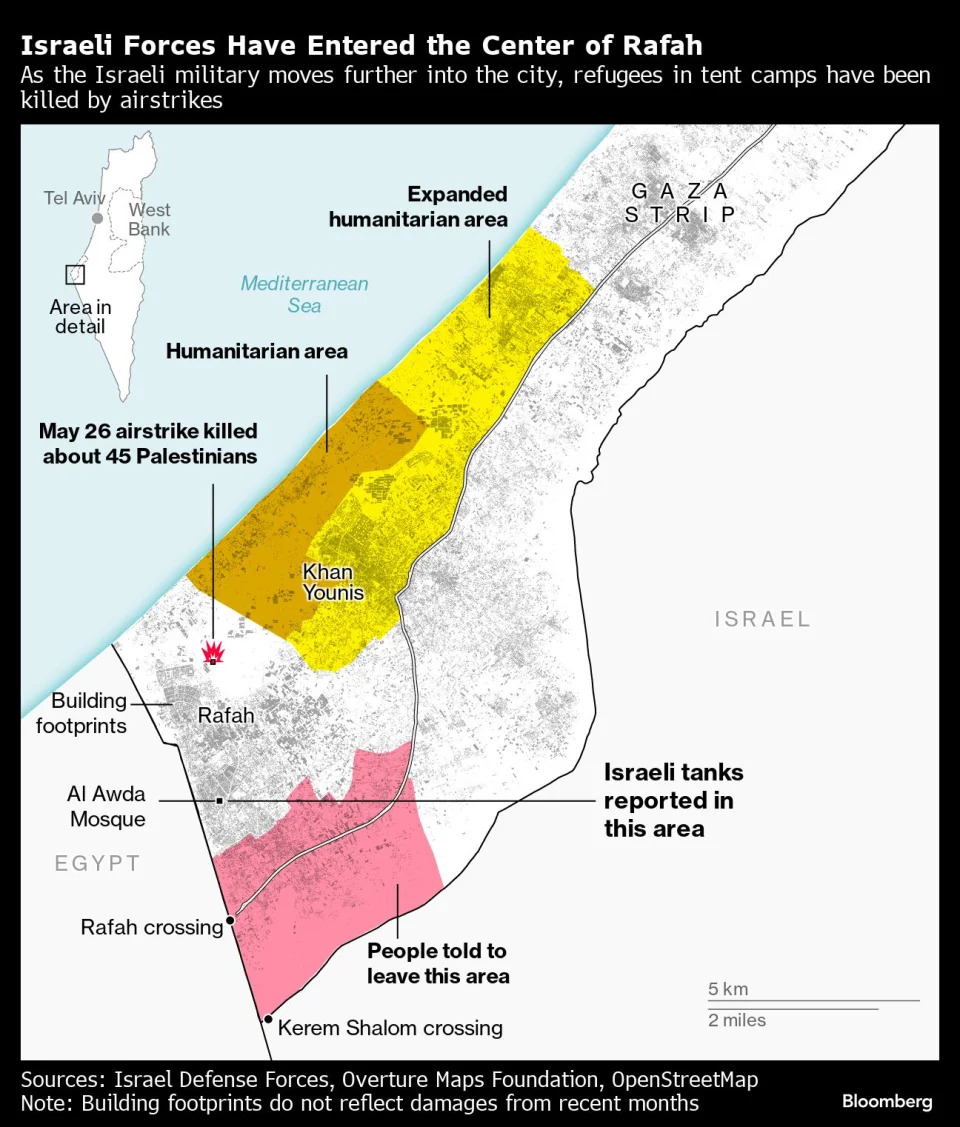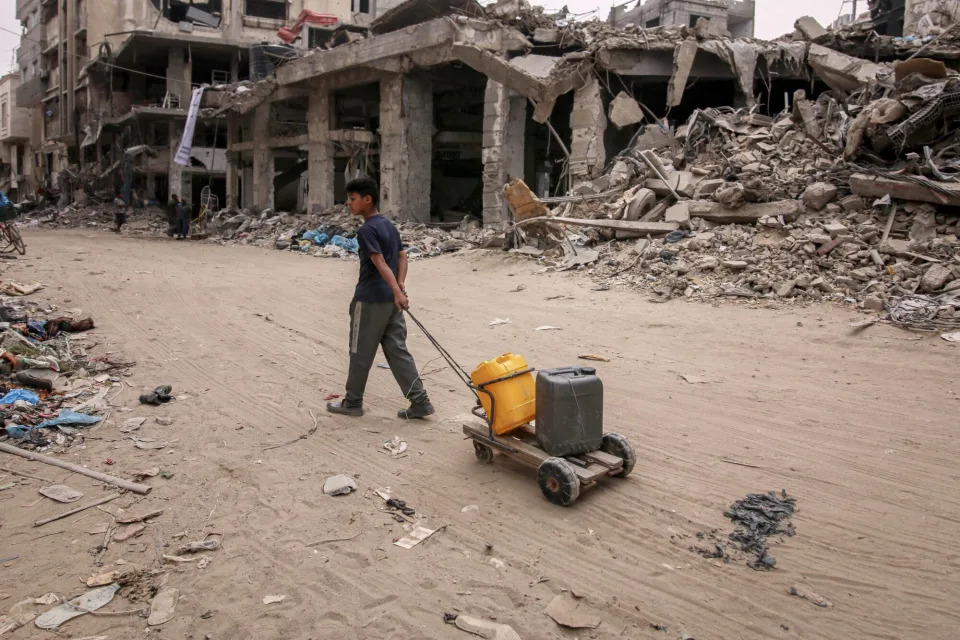Israel seeks a ‘governing alternative’ to Hamas in Gaza. It’s been tried and failed before
WCMH
The Associated Press
Sun, June 2, 2024

JERUSALEM (AP) — Israel is looking into an alternative local governing body for Gaza, the defense minister said Sunday, proposing a future beyond Hamas but giving no idea who those challengers might be.
Defense Minister Yoav Gallant’s comments came at a time of new uncertainty in the eight-month war. Israeli Prime Minister Benjamin Netanyahu is under growing pressure from many Israelis to accept a new cease-fire deal proposed by U.S. President Joe Biden, while far-right allies threaten to collapse his government if he does.
Gallant, part of Israel’s three-member War Cabinet who recently urged the government to have a detailed postwar plan for Gaza, said in a briefing that “we seek a governing alternative to Hamas. The framework for this includes isolating areas, removing Hamas operatives in these areas and bringing in other forces that will enable the formation of a governing alternative.”
That will achieve Israel’s goals of removing Hamas’ military and governing authority in Gaza and returning home the remaining hostages taken in the Oct. 7 Hamas attack that sparked the war, Gallant said. He stressed that “we will not accept the rule of Hamas at any stage in any process aimed at ending the war.”
In response to questions, an Israeli defense official told The Associated Press that Gallant hopes to enable isolated, Hamas-free areas in Gaza to become “hubs of local government” and identify forces that can enable a longer-term formation of a government.
Israel is looking for “local non-hostile actors,” the official said, adding that Gallant believes that “Palestinians should be governing Palestinians.” Israel would facilitate surges of aid to the areas, and the local forces would be responsible for distributing it to strengthen their authority.
But that approach is challenging and has failed before, one expert said.
“I haven’t heard of any local players that are brave enough to present themselves as an alternative to Hamas,” said Michael Milshtein, an Israeli analyst of Palestinian affairs at Tel Aviv University and a former military intelligence officer.
Milshtein said Gallant’s “wishful thinking” would amount to a suicidal mission for any local leader. Hamas has threatened anyone cooperating with Israel’s government.
“Although Hamas suffered severe damage over the past eight months, their impact on the public is still very strong,” he said.
Milshtein noted that Israel has tried this approach in the past. In the 1970s and ’80s, Israel tried to establish “village leagues,” empowering local Palestinian leaders.
“They were considered in the eyes of Palestinians as collaborators, and it ended in a very tragic manner,” he said. Unless Israel maintains a constant presence in Gaza, any “alternative forces” they try to install will be too fragile, he added.
Netanyahu has said Israel will maintain security control over Gaza but delegate civilian administration to local Palestinians unaffiliated with Hamas or the Western-backed Palestinian Authority, which governs parts of the occupied West Bank. He has ruled out a path to Palestinian statehood.
Top ally the U.S. has proposed that a reformed Palestinian Authority would govern Gaza with the assistance of Arab and Muslim nations.
The Hamas attack on Oct. 7 in southern Israel killed around 1,200 people — mostly civilians — and abducted about 250. About 100 hostages remain in Gaza, along with the bodies of around 30 more.
Over 36,430 Palestinians have been killed in Gaza by Israel’s offensive, according to Gaza’s Health Ministry. Its count doesn’t differentiate between civilians and combatants. Israel blames Hamas for civilian deaths, accusing it of operating from dense residential areas.
At least five people including a young girl were killed Sunday in a strike on a street in Zawayda, central Gaza, according to Palestinian health officials and AP journalists at al-Aqsa Martyrs hospital who counted the bodies.
The United States continued to press Israel on the cease-fire proposal outlined by Biden, who said Friday it’s time for the war to end. Many of Gaza’s 2.3 million people have been displaced and shelter with few supplies, large parts of the territory have been destroyed and the United Nations has warned of “full-blown” famine.
The deal’s first phase would last six weeks and include a “full and complete cease-fire,” a withdrawal of Israeli forces from all densely populated areas of Gaza and the release of a number of hostages, including women, older people and the wounded, in exchange for the release of hundreds of Palestinian prisoners. Biden acknowledged that moving into the next phase of the deal would require more negotiations.
“This was an Israeli proposal. We have every expectation that if Hamas agrees to the proposal – as was transmitted to them, an Israeli proposal – then Israel would say yes,” White House National Security Communications Advisor John Kirby told ABC.
Also Sunday, officials from Egypt, Israel and the U.S. ended a meeting in Cairo without any apparent agreement to reopen the crucial Rafah crossing into Gaza, which has been closed since Israel took over the Palestinian side of it in early May, Egypt’s state-run television channel Al-Qahera News reported.
Israel’s military continues to press into Rafah, Gaza’s southernmost city, in search of what’s been described as Hamas’ last stronghold even as the militants regroup elsewhere in the territory.
Citing an unnamed official, Al-Qahera News said Egypt affirmed that Israel must withdraw its forces from the Palestinian side of the crossing before it can reopen. The report said Egypt accused Israel of blocking the delivery of badly needed humanitarian aid to Gaza, which Israel denies.
Copyright 2024 Nexstar Media, Inc. All rights reserved. This material may not be published, broadcast, rewritten, or redistributed.
The Associated Press
Sun, June 2, 2024

JERUSALEM (AP) — Israel is looking into an alternative local governing body for Gaza, the defense minister said Sunday, proposing a future beyond Hamas but giving no idea who those challengers might be.
Defense Minister Yoav Gallant’s comments came at a time of new uncertainty in the eight-month war. Israeli Prime Minister Benjamin Netanyahu is under growing pressure from many Israelis to accept a new cease-fire deal proposed by U.S. President Joe Biden, while far-right allies threaten to collapse his government if he does.
Gallant, part of Israel’s three-member War Cabinet who recently urged the government to have a detailed postwar plan for Gaza, said in a briefing that “we seek a governing alternative to Hamas. The framework for this includes isolating areas, removing Hamas operatives in these areas and bringing in other forces that will enable the formation of a governing alternative.”
That will achieve Israel’s goals of removing Hamas’ military and governing authority in Gaza and returning home the remaining hostages taken in the Oct. 7 Hamas attack that sparked the war, Gallant said. He stressed that “we will not accept the rule of Hamas at any stage in any process aimed at ending the war.”
In response to questions, an Israeli defense official told The Associated Press that Gallant hopes to enable isolated, Hamas-free areas in Gaza to become “hubs of local government” and identify forces that can enable a longer-term formation of a government.
Israel is looking for “local non-hostile actors,” the official said, adding that Gallant believes that “Palestinians should be governing Palestinians.” Israel would facilitate surges of aid to the areas, and the local forces would be responsible for distributing it to strengthen their authority.
But that approach is challenging and has failed before, one expert said.
“I haven’t heard of any local players that are brave enough to present themselves as an alternative to Hamas,” said Michael Milshtein, an Israeli analyst of Palestinian affairs at Tel Aviv University and a former military intelligence officer.
Milshtein said Gallant’s “wishful thinking” would amount to a suicidal mission for any local leader. Hamas has threatened anyone cooperating with Israel’s government.
“Although Hamas suffered severe damage over the past eight months, their impact on the public is still very strong,” he said.
Milshtein noted that Israel has tried this approach in the past. In the 1970s and ’80s, Israel tried to establish “village leagues,” empowering local Palestinian leaders.
“They were considered in the eyes of Palestinians as collaborators, and it ended in a very tragic manner,” he said. Unless Israel maintains a constant presence in Gaza, any “alternative forces” they try to install will be too fragile, he added.
Netanyahu has said Israel will maintain security control over Gaza but delegate civilian administration to local Palestinians unaffiliated with Hamas or the Western-backed Palestinian Authority, which governs parts of the occupied West Bank. He has ruled out a path to Palestinian statehood.
Top ally the U.S. has proposed that a reformed Palestinian Authority would govern Gaza with the assistance of Arab and Muslim nations.
The Hamas attack on Oct. 7 in southern Israel killed around 1,200 people — mostly civilians — and abducted about 250. About 100 hostages remain in Gaza, along with the bodies of around 30 more.
Over 36,430 Palestinians have been killed in Gaza by Israel’s offensive, according to Gaza’s Health Ministry. Its count doesn’t differentiate between civilians and combatants. Israel blames Hamas for civilian deaths, accusing it of operating from dense residential areas.
At least five people including a young girl were killed Sunday in a strike on a street in Zawayda, central Gaza, according to Palestinian health officials and AP journalists at al-Aqsa Martyrs hospital who counted the bodies.
The United States continued to press Israel on the cease-fire proposal outlined by Biden, who said Friday it’s time for the war to end. Many of Gaza’s 2.3 million people have been displaced and shelter with few supplies, large parts of the territory have been destroyed and the United Nations has warned of “full-blown” famine.
The deal’s first phase would last six weeks and include a “full and complete cease-fire,” a withdrawal of Israeli forces from all densely populated areas of Gaza and the release of a number of hostages, including women, older people and the wounded, in exchange for the release of hundreds of Palestinian prisoners. Biden acknowledged that moving into the next phase of the deal would require more negotiations.
“This was an Israeli proposal. We have every expectation that if Hamas agrees to the proposal – as was transmitted to them, an Israeli proposal – then Israel would say yes,” White House National Security Communications Advisor John Kirby told ABC.
Also Sunday, officials from Egypt, Israel and the U.S. ended a meeting in Cairo without any apparent agreement to reopen the crucial Rafah crossing into Gaza, which has been closed since Israel took over the Palestinian side of it in early May, Egypt’s state-run television channel Al-Qahera News reported.
Israel’s military continues to press into Rafah, Gaza’s southernmost city, in search of what’s been described as Hamas’ last stronghold even as the militants regroup elsewhere in the territory.
Citing an unnamed official, Al-Qahera News said Egypt affirmed that Israel must withdraw its forces from the Palestinian side of the crossing before it can reopen. The report said Egypt accused Israel of blocking the delivery of badly needed humanitarian aid to Gaza, which Israel denies.
Copyright 2024 Nexstar Media, Inc. All rights reserved. This material may not be published, broadcast, rewritten, or redistributed.
US Says Fresh Gaza Cease-Fire Proposal Is ‘Decisive Moment’
Justin Sink and Fares Akram
Sat, June 1, 2024


(Bloomberg) -- The US said a fresh cease-fire proposal that would pause fighting between Israel and Hamas for at least six weeks could mark a “decisive moment” in the conflict — if both sides agree terms after several failed attempts at peace.
President Joe Biden said Hamas has been weakened to the point it could no longer carry out an attack like the deadly Oct. 7 incursion into Israel that triggered the war. Detailing the three-part proposal from the White House on Friday afternoon, he urged all parties to accept the deal.
Israel is on board with the plan and “Hamas says it wants a cease-fire,” Biden said. “Hamas needs to take the deal” and by doing so prove that the group is serious about wanting to end the conflict, he added.
Yet Israeli Prime Minister Benjamin Netanyahu emphasized that he hasn’t changed his conditions for ending the war. Those are “the destruction of Hamas’s military and governing capabilities, the freeing of all hostages and ensuring Gaza doesn’t pose a threat to Israel,” his office said in a statement on Saturday.
“The notion that Israel will agree to a permanent cease-fire before these conditions are fulfilled is a non-starter,” he said.
The Israeli leader’s comments suggested a willingness to go on fighting, and his national security adviser said last week Hamas would not be defeated before the end of the year. But Netanyahu accepts the pathway laid out by Biden and was directing his latest statement at more conservative coalition members and domestic supporters, according to a US official with knowledge of the situation.
Hamas, designated a terrorist organization by the US and European Union, has said it’s ready “to deal positively and constructively with any proposal” based on an indefinite stop to the conflict, including a complete Israeli withdrawal from Gaza. The Iran-backed group called for the return of displaced Gazans to their homes, and “the completion of a serious prisoner-exchange deal” for hostages.
Taken together, the comments show fresh impetus by the US to secure a deal that will be agreed by both sides — an achievement that would count as a major win for Biden just months before the US elections. Yet neither Israel nor Hamas appears to have changed its position substantially, suggesting there’s much work left to do.
Hamas said it “views positively” what the president said, particularly “his call for a permanent cease-fire.”
Israel and Hamas have held back-and-forth negotiations via Qatari and Egyptian mediators throughout the nearly eight-month war that’s convulsed the Middle East and devastated the Gaza Strip.
The two sides have been unable to reach an agreement to pause the fighting since a short break in late November. Negotiators appeared close to striking an understanding about a month ago, only for talks to fall apart. Since then, Israel has sent ground troops into Rafah, the southern Gazan city where it says some Hamas leaders and thousands of fighters are based.
Read more: Why Israel’s Rafah Operation Is So Worrying: QuickTake
US Secretary of State Antony Blinken spoke separately by phone about the proposal with his counterparts in Jordan, Saudi Arabia and Turkey, all countries key to longer-term regional stability. United Nations Secretary General António Guterres endorsed the framework.
The war started when Hamas fighters attacked Israel on Oct. 7, killing some 1,200 people and taking about 250 hostages. Israel’s subsequent campaign to destroy the group has left more than 35,000 people dead in Gaza, according to authorities in the Hamas-run enclave, and triggered a grave humanitarian crisis.
The war has stoked broader regional tensions and briefly brought Israel and Iran into rare direct conflict. Iran backs Hamas and other militant groups operating across the Middle East, which have ramped up attacks on shipping in the Red Sea and targeted US military bases.
Read More: How Iran-Backed Groups Provoke Wider Mideast Conflict: QuickTake
For Biden, an agreement would help blunt the political damage he’s sustained, as his support for Israel has fractured his electoral coalition. Progressive voters have called on him to break with Netanyahu and restrict arms shipments, while a series of high-profile protests on college campuses have added further pressure.
Biden sketched out a three-part road map for the agreement, with a first phase that would last for six weeks and see Israel withdraw from all populated areas of Gaza. Hamas would release some hostages and the bodies of some of those killed in captivity, while Israel would return some Palestinian prisoners.
A second phase would see the exchange of all remaining living hostages and the removal of Israeli troops from Gaza, followed by a third phase that would see a major reconstruction plan commence.
Read more: Biden Sticks to ‘Tightrope’ Israel Policy as Rafah Deaths Mount
The offer is almost identical to a cease-fire plan Hamas presented several weeks ago, according to a senior US official who briefed reporters after Biden spoke. The official, who requested anonymity to describe internal thinking, added that Hamas has privately been more open to a deal than its public statements would suggest. Israel rejected that proposal out of hand.
Biden addressed tensions within Netanyahu’s government, which relies on the support of right-wing parties, saying that Israel risks draining its resources and becoming further isolated internationally the longer the war goes on.
“The people of Israel should know they can make this offer without any further risk to their security,” Biden said. “I know there are those in Israel who will not agree with this plan.”
--With assistance from Akayla Gardner, Patrick Sykes and Josh Wingrove.
(Updates with US official comment in sixth paragraph.)
No comments:
Post a Comment